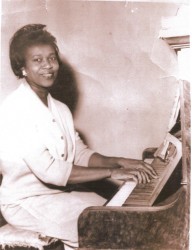By Karen Davis
Almost unnoticed last Christmas Day, one of Guyana’s most accomplished musicians, Joyce Ferdinand-Lalljie (later Saunders) died in Birmingham in the United Kingdom. A child prodigy who began playing one of her mother’s piano pieces at age three, Joyce Ferdinand-Lalljie was a concert pianist/classical music composer. Both she and her younger sister Mavis became concert pianists and were known as ‘the two Ferdinand girls.’
Joyce Ferdinand was born in 1923 in New Amsterdam, Berbice. Her mother Edith was an important musical personality in New Amsterdam, and was a music teacher and organist at two churches – St Patrick’s Anglican Church and Mission Chapel Congregational Church. Joyce, in fact, succeeded her mother as organist at Mission Chapel Church at the age of 21.
In 1946, she married Rev William Lalljie, who encouraged her to continue her musical career, which took her to the United Kingdom, the United States and back to Guyana.

Apart from her mother, Joyce’s music teacher was Mrs Ruby McGregor, under whose tutelage, she earned the Licentiate of the Royal Schools of Music in 1948.
Joyce Ferdinand-Lalljie is accredited as being the first black woman, if not the first woman to play a full piano concerto – this was under the baton of the world famous Rudolph Dunbar in the 1950s. She was also the first Guyanese to perform a piano concerto with the British Guiana Philharmonic Orchestra.
In his article on radio in British Guiana for the 1951 Chronicle Christmas Annual, Albert E L Isaacs described Joyce Ferdinand-Lalljie as one of the ‘big finds’ of local radio and stage during 1951. Isaacs stated that Ferdinand-Lalljie’s genius was shared with the people of British Guiana through the radio programme “Berbice Calling,” which was produced by Olga Lopes-Seale.
By 1951, Joyce was the toast of the nation; she dominated classical music and was celebrated for her performances on the British Council broadcasts. In 1951, The Guiana Times newspaper voted her ‘Musician of the Year.’
Before leaving for the United Kingdom on a British Council scholarship in the early 1960s, Joyce relocated to Georgetown, where she established herself as an innovative teacher, performer and composer. The British Council scholarship enabled her to study at the Trinity College of Music in London, where she completed diploma programmes in piano education and the teaching of music in schools. She was awarded the Fellowship of the Trinity College of Music (FTCL) in 1964.
Between 1964 and 1976, Joyce taught music in Birmingham. She returned to Guyana in 1976 to accept an appointment as a lecturer at the Cyril Potter College of Education. Although her stay in Guyana was relatively short, she engaged in a number of activities which influenced her music creativity; these included a renewal of her contact with Guyanese folk music and her engagement with ‘Broadcast to Schools’ programme.
She repeatedly visited her homeland, which were always followed by compositions celebrating the Guyanese landscape. In her correspondence with the editors of One Hundred Years of Classical Music in the Guianas: Selected Pieces for Pianoforte (Snijders and Loncke), she explained:
“The effect on me was profound, and thoughts of Guyana and the difference in life-style produced acute nostalgia. I was compelled to use the only means of expression at my disposal, and it was this feeling that impelled me into composing.”
Her devotion to Guyanese music and song was steadfast.
Upon retiring from teaching, she continued her concert performances and began composing, becoming the foremost female composer of classical music. Joyce composed for viola, flute, voice and piano. Her “Carousel for Flute” was premiered by flautist Keith Waithe. Among her compositions for piano are: “Odyssey of the Demerara River,” “Three o’clock in Bourda,” “The Legend of Kaie,” “Stabroek Blues,” “Water Lily Canal by Moonlight” and “Janie Gal.” She also composed music for “The Lord’s Prayer” as a thank you to the Lord for her gift of music and dedicated it to the members of West Green Baptist Church.
Joyce Ferdinand-Lalljie’s funeral service was held in Birmingham in January of this year. As per her wishes, her ashes will soon be scattered in the Demerara River.








